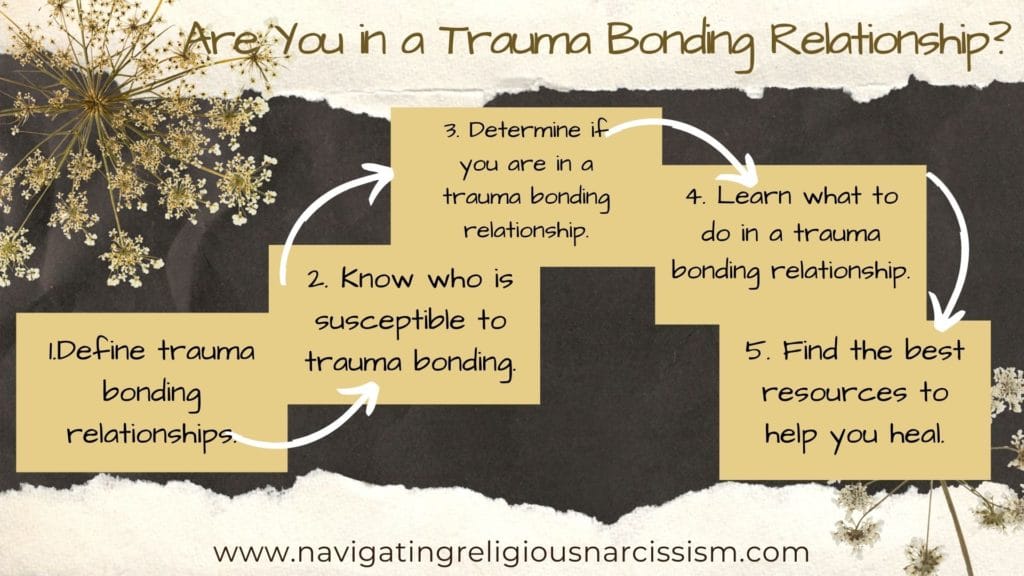Reviewed by Karis A. Williams, MSMHC, LPC, January 13, 2024
Anybody can find themselves in an abusive relationship. In order to be in relationship with others, we have to be vulnerable to a point. And as the relationship progresses, vulnerability can continue to progress as you feel safe and the relationship feels genuine and good. But if abusive behavior starts to emerge from the relationship, those who do not understand emotional health can find themselves in a trauma bonding relationship.
So, how do we find out if we are in an abusive relationship and, in fact, in a trauma bonding relationship? Generally speaking, the first thing you want to do is read up to find out what a trauma bonding relationship looks like. Then, evaluate your relationship to see if you are exhibiting any of the signs. If you are, then you need to start taking steps toward learning healthy emotional relationships and apply it to your troubled relationship. That generally includes counseling, confiding in friends, and more reading/studying.
Let’s take a more in-depth look at what being in a trauma bonding relationship looks like and where to go from there.
Table of Contents
What is Trauma Bonding?
Trauma bonding is when someone (male or female) develops an attachment to someone who does them harm (often a narcissist–not to be confused with a normal person with narcissistic tendencies) on a regular basis. The trauma bonding victim tricks themselves, often unwittingly, into trusting and believing their abuser is a good person and actually intending to do them good and not harm. They generally concentrate on all of the good things that happen in the relationship.
Those good things are often designed to fool the trauma bonded victim into thinking the relationship is good so they will stay. As things get dicey, the abuser will throw out positive reinforcements in order for the victim to think things are okay and they should stay. Once the victim feels safe enough to le their guard down, the abusive behavior begins again. Well, until the abuser once again needs to convince the victim that the relationship is worth staying for.
This cycle continues for as long as the victim will allow it. And as long as they are allowing it or not leaving, there is no incentive for the abuser to stop abusing, except to suck the victim back in. It is an insidious game of cat and mouse.
Who is Susceptible to Trauma Bonding?
Virtually anybody can get sucked into a trauma bond, but emotionally healthy people will not stay there. They will figure it out pretty quickly and move along.
Trauma bonding victims include very intelligent people as well as underprivileged people. It affects all walks of life, genders, ages, etc.. It is most dangerous for people that have been abused previously and don’t understand the warning signs of the abuse to get themselves to safety sooner than later.
And finally, trauma bonding also can happen in any relationship. That is because being in relationship with someone is the key marker to getting close enough to abuse them on that level. It is not just for couples. Trauma bonding also appears in the following relationships:
- Employer-employee, employer-employer, employee, employee, and literally any other work relationship
- Parent-child
- Grandparent-child
- Siblings
- Any relative toward any other relative
- Military, usually based on rank position
- Church heirarchy
- Cults
- Fraternity/sorority groups
- Kidnapping cases
Actually, trauma bonding can happen in any relationship where one person is on the upside and the other is on the downside. The key here is to figure out if you are being mistreated with any of the signs of trauma bonding. And that leads us to the next point!
How do You Know You are in a Trauma Bonding Relationship?
If you think you are in a trauma bonding relationship, there are several signs that will be able to show you whether you are or not. Here are some of them:
- Trauma Bonding Covers Up and Excuses Abuse
- Trauma Bonding Isolates Helpers From the Victim
- Trauma Bonding Usually Involves the Victim Blaming Themselves
- People Stay Trauma Bonded Because They Fear They Won’t Land on Their Feet
- Trauma Bond Victims Don’t Leave Because They Keep Waiting for Things to Get Better
- Trauma Bond Victims Give Their Abusers the Benefit of the Doubt–Just in Case
- Trauma Bond Victims Stay for Even the Smallest Love and Attention
- Trauma Bond Victims Feel too Trapped to Leave
- Trauma Bond Victims Likely Have Physical Issues Stemming from the Trauma
- Trauma Bonded Victims Have Trouble Trusting Their Own Instincts
- Trauma Bond Victims Lose Their Motivation
- Trauma Bond Victims Easily Accept the Blame Because it is Easier Than Defending Themselves
- Trauma Bond Victims are Afraid to Say No
- Trauma Bond Victims are Very Careful to Not “Out Their Abuser” Because They Will End up Paying for It
- Trauma Bond Victims Give the Relationship Everything They’ve Got and it’s Still Not Good Enough
- Trauma Bond Victims Almost Always Put Their Abuser’s Needs Above Their Own
- Trauma Bond Victims Make Their Friends and Family Think Everything is Fine
- Trauma Bond Victims Feel Invisible
- Trauma Bond Victims Have Panic Attacks
- Trauma Bond Victims Can Have Nightmares
- Trauma Bond Victims May Have Symptoms of PTSD or C-PTSD
- Trauma Bond Victims are Always Trying to Fix Everything
- Trauma Bond Victims Lose Their Sense of Reality
- Trauma Bond Victims are Afraid to Criticize Their Abuser
- Trauma Bond Victims Want to Have Sympathy for Their Abusers
Feel free to click on any of the above signs of trauma bonding to learn more about them. For an article that goes in depth regarding the signs of trauma bonding, click here.
Having a few of these characteristics does not definitively mean you are in a trauma bonding relationship. But if you have several and they seem to occur in consistent patterns then chances are you are in a trauma bonding relationship on some level.
What to do if You Think You are in a Trauma Bonding Relationship?
If you feel that you are or you are not sure, it would be a good idea to speak to a counselor that has experience in narcissism, codependency, and trauma bonding issues. I was very fortunate (actually I would say blessed because I believe God had a huge hand in delivering my kids and me out of this) to have been matched up with a counselor who understood what was going on right away. And she was chosen by my narcissistic ex-husband because he was trying to get the counselors to force me to “obey” him. It was one of his final acts of control before the marriage was over. And God had my back.
Secular as well as Christian counselors have come a long way in how they treat narcissism/codependency/trauma bonding issues. And I think that most places will have a counselor that will work for you.
Be Careful of Counseling That Makes Abuse Worse
The one kind of counselor I would fully recommend against is nouthetic counseling. It does not line up with scientifically proven healing strategies of abuse issues. Instead, it is still deeply entrenched in the woman remaining in servitude to her abusive husband. If she does not, there will be hell to pay, on the church leadership side as well as from the husband. It is a downright dangerous situation for many women who seek help in this arena.
It says it is “Biblical Counseling.” Unfortunately, the Bible is quite twisted in favor of the abusive husband. And not at all what Scripture says regarding Biblical marriage. You can read more about the problems with nouthetic counseling here.
Click here for an article that directly shows the damage done to abused women by nouthetic counseling, which is administered by people who would never be certified in a reputable counseling agency.
On the flip side, for a GOOD book on what Scripture really says regarding Biblical marriage and abuse issues, check out Leslie Vernick’s The Emotionally Destructive Marriage. It was a life-changing healing book for me. It is critical for you to find good support after years of trusting in someone who had no regard for your safety or wellbeing, or even humanity for that matter.
Some Good Resources to Help Those in a Trauma Bonding Relationship
My counselors had the absolute best resources that helped me get back on my feet after a lifetime of abuse, in the home I grew up in and then straight into my ex-husband’s home for the next 31 years before all was said and done. Here are some of them:
Do you think you may be involved in a trauma bond relationship? Take this quick test to get more information!
For a more complete list, click on my resources page here. I pray every day that everyone who visits this site finds the peace and healing that I have found. Feel free to comment below, or if you need to be more private, message me here. Be blessed!

Note: If you feel like you are in immediate physical danger, call the National Domestic Abuse Hotline at 800-799-7233 or visit them online.
If you liked this article, I think you will also love the following articles:
Signs of Trauma Bonding You Need to Look Out For
What to do When Your Narcissist Threatens You
The Bible Used as a Weapon Against You: You can Overcome!
What Does the Bible say About Abusive Husbands?
The Link Between Spiritual Abuse and Narcissism
What Does the Bible Say About Abusive Husbands?
The Link Between Spiritual Abuse and Narcissism
Can a Narcissist Change for Love?
Why are You Attracting Narcissists?
Why Narcissists Love Going to Church
Does a Narcissist Know They are a Narcissist?
How Religious Narcissists Think?
Can a Narcissist be a Good Person?
Narcissistic Behavior: What to Look Out For
Praying for Your Narcissistic Husband
Are Spiritual Narcissists Overt or Covert?
How to Navigate Religious Narcissistic Parents
What Happens to the Soul of a Narcissist?
How to Heal From a Spiritual Narcissist
Can You Maintain a Relationship With a Spiritual Narcissist?
Can Narcissists Have a Spiritual Awakening?
How Will God Judge a Narcissist?
When the Church Says to Move Back in With Your Narcissist
What Can We Say to a Friend Who’s Divorcing
23 Reasons Why Narcissists are Drawn to the Church
When the Church Doesn’t Recognize Narcissistic Abuse
Will the Church Support Divorcing a Narcissist?
What Does the Bible Say About Narcissism?
Can a Spiritual Narcissist Heal?
Can a Narcissist Be a Christian?
What Does the Spiritual Narcissist Do When You Try to Leave?
- How to Choose the Best Attorney When Divorcing a Narcissist - March 23, 2024
- Why Won’t God Heal my Narcissist? - February 28, 2024
- How Narcissists Use Religion to Control and Manipulate You - December 26, 2023










